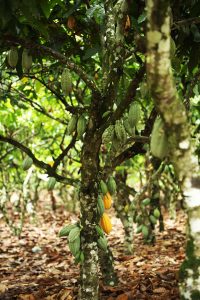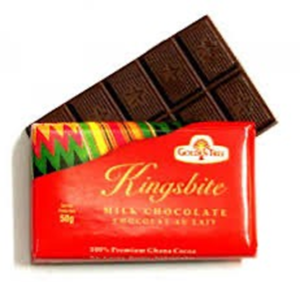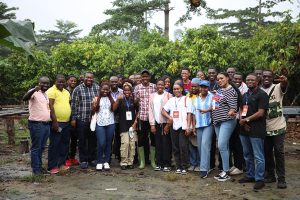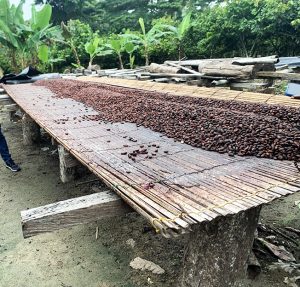In the cocoa heartlands of Ghana’s Central Region, 37-year-old Samuel Torbi stands on his 17-acre cocoa farm at Otabil Nkwanta in the Assin South District. After more than a decade of toil, his farm is now a model for climate-smart, science-driven agriculture—thanks to training from the Ghana Cocoa Board (COCOBOD) and the Deutsche Gesellschaft für Internationale Zusammenarbeit (GIZ), the German development agency.

As he leads young journalists through rows of healthy cocoa trees, Torbi points to a thick carpet of mulched leaves beneath their feet.
“This keeps moisture in and weeds out. It also feeds the soil. You’ll see plenty of worms and millipedes here. That’s how you know the land is alive,” he said.
Towering shade trees, carefully planted to mitigate the effects of rising temperatures, cast a soft green light over the farm—an emblem of Ghana’s push toward sustainable cocoa farming in line with the EU Deforestation Regulation (EUDR).
Under this framework, cocoa linked to deforestation or human rights abuses will no longer be welcome in European markets. In response, Ghana has partnered with the European Union, the German Federal Ministry for Economic Cooperation and Development (BMZ), GIZ, and COCOBOD to meet the new standard.
But beneath this proud progress lies a haunting paradox. “Some of us have never even seen a bar of chocolate,” Torbi says quietly. “We grow the cocoa, but we can’t afford the products made from it.”
The Chocolate Gap
Ghana is the second-largest cocoa exporter in the world, with over 800,000 farmers – 60% men, 40% women – spread across seven cocoa-producing regions: Ashanti, Central, Eastern, Western North, Western, Bono, and Volta. Yet, most of these farmers have never tasted chocolate.

Though per capita chocolate consumption in Ghana has increased from 0.45 kg to 1kg, this statistic marks a grim reality: chocolate remains a luxury in rural cocoa communities.
“To buy a single bar, you might need GHC70 to GHC100,” Torbi explains adding “Most farmers just can’t afford that. We produce the cocoa, but it is the town folks who eat the chocolate.”
Factories Rising, But Access Falling
Ghana now boasts several cocoa processing facilities—such as the Cocoa Processing Company (CPC) in Tema, which produces Golden Tree chocolate, and private companies like Niche Cocoa, 57 Chocolate, Midunu Chocolates, and Omama Royal Chocolate.
But the finished products rarely make it back to the villages where the cocoa is harvested.
“At COCOBOD offices, they drink Milo and snack on Pebbles. But when they visit us farmers, they never think to bring any. And yet, it’s our beans they use,”Torbi again said.
A Nutritional and Emotional Toll
COCOBOD promotes cocoa products as health-enhancing—rich in antioxidants, mood boosters, and energy stimulants. Cocoa’s theobromine is even known to support heart health and brain function. Yet the very people growing this nutritional powerhouse are deprived of its benefits.
“If it truly makes people healthier, why are we the ones left out? Are our bodies and minds less important?”, ”Torbi asked
A Cry for Inclusion
Torbi, who chairs the Assin Fosu branch of the Cocoa, Coffee and Sheanut Farmers Association (COCOSHE), told this reporter that cocoa farmers aren’t looking for handouts.

“We want fairness. If Ghana is making chocolate from our cocoa, then COCOBOD and the companies must ensure that some of it reach the people who grow the beans. Let our children taste what we produce. Let us feel part of the story.”
He believes this simple gesture could boost morale, improve nutrition, and strengthen national pride in Ghana’s chocolate identity.
Cocoa as a Luxury in a Cocoa Nation
The global chocolate industry is valued at over $130 billion. That the backbone of this wealth—Ghanaian cocoa farmers—cannot afford even one bar of chocolate is not just ironic. It is unjust.

As Ghana deepens its efforts in value addition, local consumption, and traceability, it must also address the social injustice within its own borders. Climate compliance and transparency mean little if cocoa producers remain excluded from the fruits of their labour.
“It’s not just about chocolate. It’s about dignity,” Torbi argued during the interview with Ghe Chronicle.
Traceability, Sustainability, and Justice
Ghana’s cocoa sector is undergoing digital transformation. Under COCOBOD’s traceability programme, developed with GIZ support, farmers are issued ID cards and their cocoa quantities are logged. The system promotes environmentally friendly practices, including composting and shade farming, and also discourages child labour by encouraging education.
“We now use compost instead of chemicals. Our yields are better, and the cocoa is safer,”Torbi said
While this system places Ghana at the forefront of ethical cocoa production, Torbi believes that true sustainability must start with social inclusion.
The Sweet Taste of Justice
Torbi’s voice carries the hopes of many rural farmers whose livelihoods remain tied to a commodity they rarely enjoy.“Let the people who grow cocoa be part of Ghana’s chocolate story. Let justice be as sweet as the chocolate we produce,” he suggested.
Mr. Farouk Quansah Nyame, a Senior Manager at the Cocoa Marketing Company, admitted that local consumption of cocoa remains low. In a media briefing, he emphasized that COCOBOD’s Public Affairs Department is stepping up its campaign to make cocoa a regular part of Ghanaian diets.
“Cocoa is good for health. More Ghanaians need to benefit from what we produce,”Mr. Nyame said. Until that happens, Ghana remains a nation where the hands that harvest cocoa are still strangers to its sweetest reward.










